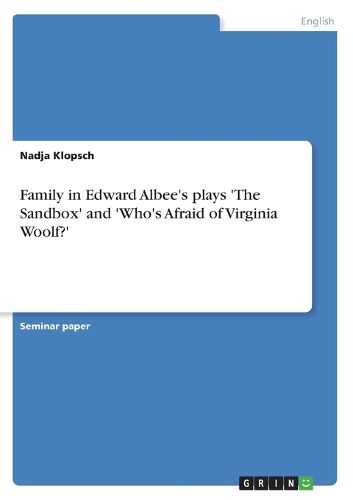Readings Newsletter
Become a Readings Member to make your shopping experience even easier.
Sign in or sign up for free!
You’re not far away from qualifying for FREE standard shipping within Australia
You’ve qualified for FREE standard shipping within Australia
The cart is loading…






Seminar paper from the year 2008 in the subject English Language and Literature Studies - Literature, grade: 1,3, Ernst Moritz Arndt University of Greifswald (Department of English and American Studies), course: Modul Specialisation, language: English, abstract: The American dramatist Edward Albee is going to celebrate his 80th birthday these days. In his life he observed several decades of American society as well as changes in attitudes and values of the American population. In almost all of his plays Edward Albee looks at the American family and its various manifestations, criticises it, mocks it, and reveals its dishonesty. His plays frequently contain the figure of the child which ranges from that of the adopted infant, real or imagined baby, young man, dead child, imaginary person, to that of grown-up homosexual son (Cristian 1). The figure of the child is often understood as the alter ego of Edward Albee (Cristian 6). Shortly afterwards his birth on March 12 1928 Albee was adopted by a wealthy couple. The family was part of the New York high society and tried to bring up their son to be a respectable constituent of this community. Edward Albee sensed early that he was not the couple’s biological son. He experienced several conflicts with his parents who disapproved of his lifestyle, interests, sexual orientation and acquaintances. After some years at various boarding schools and colleges, Albee finally and abruptly left home and broke ties with his adoptive parents in 1949. Albee took employment as runner in an advertising agency, sales clerk in a music shop, bookseller-assistant, waiter in convenience restaurant and telegram deliverer for Western Union. His various occupations not only allowed him to write but through his jobs he was able to observe quite a number of different people and lifestyles. In an interview about his plays and the assumed analogousness of his plays he said: You must remember
$9.00 standard shipping within Australia
FREE standard shipping within Australia for orders over $100.00
Express & International shipping calculated at checkout
Seminar paper from the year 2008 in the subject English Language and Literature Studies - Literature, grade: 1,3, Ernst Moritz Arndt University of Greifswald (Department of English and American Studies), course: Modul Specialisation, language: English, abstract: The American dramatist Edward Albee is going to celebrate his 80th birthday these days. In his life he observed several decades of American society as well as changes in attitudes and values of the American population. In almost all of his plays Edward Albee looks at the American family and its various manifestations, criticises it, mocks it, and reveals its dishonesty. His plays frequently contain the figure of the child which ranges from that of the adopted infant, real or imagined baby, young man, dead child, imaginary person, to that of grown-up homosexual son (Cristian 1). The figure of the child is often understood as the alter ego of Edward Albee (Cristian 6). Shortly afterwards his birth on March 12 1928 Albee was adopted by a wealthy couple. The family was part of the New York high society and tried to bring up their son to be a respectable constituent of this community. Edward Albee sensed early that he was not the couple’s biological son. He experienced several conflicts with his parents who disapproved of his lifestyle, interests, sexual orientation and acquaintances. After some years at various boarding schools and colleges, Albee finally and abruptly left home and broke ties with his adoptive parents in 1949. Albee took employment as runner in an advertising agency, sales clerk in a music shop, bookseller-assistant, waiter in convenience restaurant and telegram deliverer for Western Union. His various occupations not only allowed him to write but through his jobs he was able to observe quite a number of different people and lifestyles. In an interview about his plays and the assumed analogousness of his plays he said: You must remember